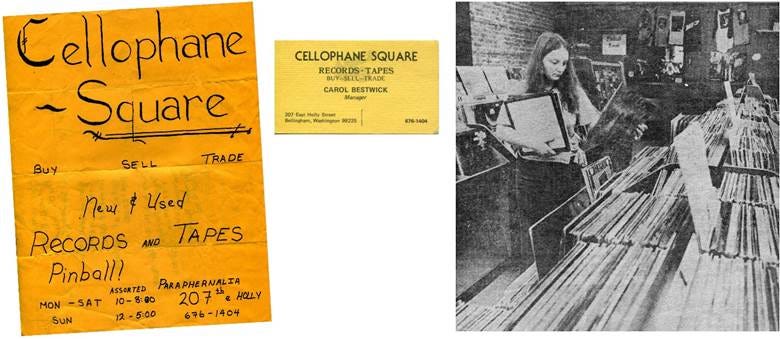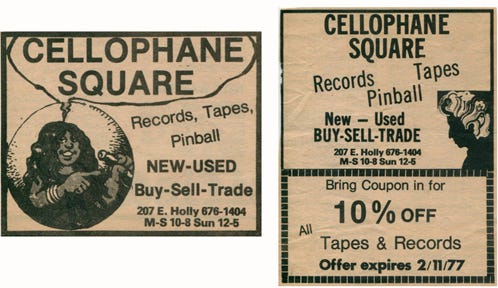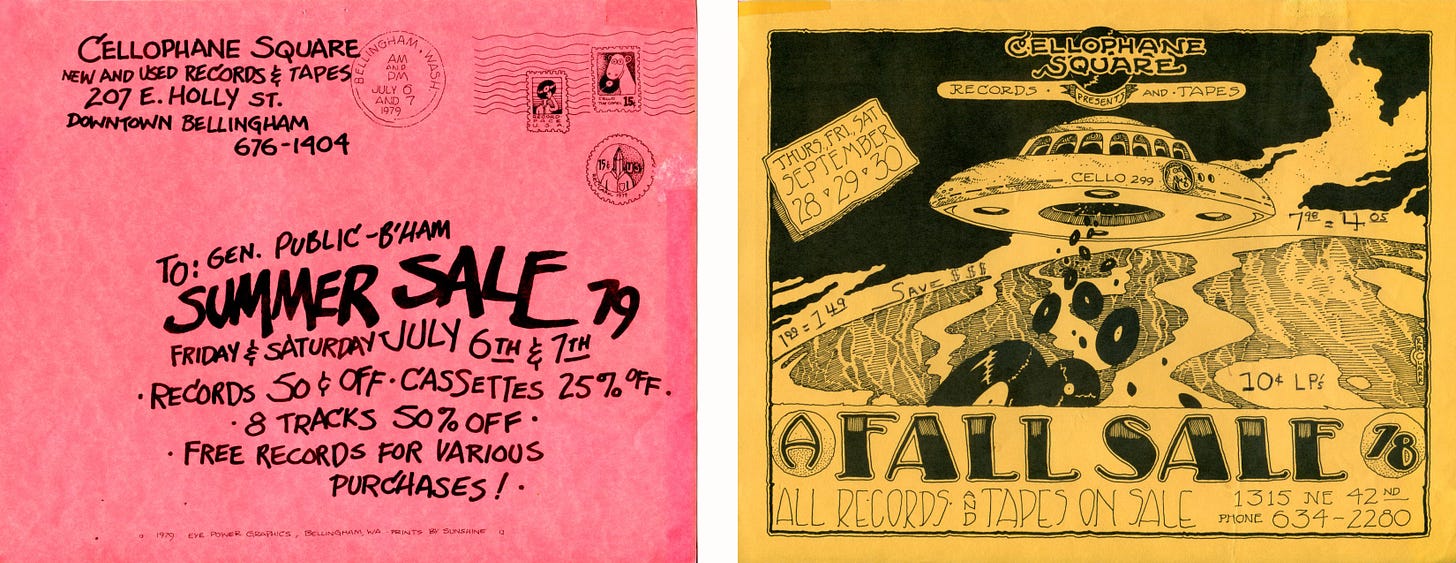The Record Store Years 44) Bellingham Store #1: E. Holly Street Location (1976)
A memoir of 25 years (1975-2000) spent working in the world of records & music in Seattle, with occasional side trips into writings on Led Zeppelin and other adventures from my musical life.
Bellingham is located 90 miles north of Seattle in typically beautiful Northwest environs. In the late ‘70s its population was around 50,000 (it’s grown to over 90,000 in 2025) and the core of its local economy was the lumber industry, which at that time was in decline. What distinguished Bellingham from similar ‘payroll towns’ and made it an ideal location for a second Cellophane Square was the presence of Western Washington University, a large liberal arts college that ensured a steady, ever-changing population of young people and all the cultural benefits that went with it.
I was still relatively new at the U-District store when the Bellingham expansion was conceived and I had no part in the planning process, however everyone on the staff was excited about the project and helped in various ways. The expansion also created a ripple effect in staff promotions – Carol, the assistant manager at the U-district store, was promoted to manager of the new store and moved to Bellingham, and I filled her spot under store manager Roy.
Above: DIY marketing campaign for the new store (left), and at right one of the few pictures I can find showing the interior of the original Bellingham store, featured in a March 1977 article in the Bellingham Herald newspaper.
The Bellingham store was an immediate success and remained in the original E. Holly Street location for over six years, on a nondescript block at the edge of the downtown retail area. It was right next door to a dive bar and had few other retail businesses around it, but there was plenty of foot and car traffic going by all day. The glass entry door was flanked by a large display window to the left and the interior space was smaller than the U-District in size – maybe 500 to 800 square feet, with a drop ceiling and a small office sectioned off at the back. From the office a door opened into a cavernous, high-ceilinged back room larger than the entire front retail area. This eventually became the home of the melts, with 15-foot high record shelves that Roy built lining the walls and capacity for thousands of LPs that eventually filled up.
Initially the new store was stocked with used LPs and tapes sent up from Seattle, however most important in opening a new location was seeing that it became self-sufficient in terms of buying its own used product so that we were not supplying two stores from one buying market. Fortunately, the owners had chosen the location well, and the Bellingham store started buying for itself right away and established the same good reputation we had in Seattle for fair dealing. Though never as big a source of product as Seattle, over the years the Bellingham buying market remained strong for the same reasons it did at the U-District store – the regular ebb and flow of students at the nearby University.
Above: Early ads for the Bellingham store, making creative use of album art. Probably placed in the WWU student newspaper the Western Front.
From an operational standpoint, one of the hallmarks of the Bellingham store for me was that it had ongoing management problems over the years. The first few years went well enough with Seattle transplant Carol in charge, but when she and Roy both moved on, Dick was promoted to Seattle store manager and I was moved into the new position of ‘Regional Manager’ and became directly responsible for both of the store’s operations.
The management team that evolved following Carol’s departure and played a big role in defining the store for a while were two guys named David (manager) and Brad (assistant manager). David was thin, blonde and intense; Brad more outgoing, bearded with long brown hair and a deep, booming voice. They and their circle of friends, some of whom became staff, were bright, outgoing and full of piss ‘n’ vinegar – they had strong views about everything and their tastes in music and the arts ran to the more Avant Garde and extreme expressions of creativity. Artists like The Residents, Henry Cow, Fred Frith, and Frank Zappa were among their passions, and just as the Seattle store reflected the power pop sensibilities of Dick and myself, the Bellingham Cellophane Square came to very strongly reflect the tastes and personalities of David and Brad.
Above: Dulcet tones to lure in the customers
While there may or may not have been a direct correlation between this and the store’s business, there’s no question that conflicts developed between the David and Brad team and upper management (myself) and the owners over the atmosphere and operations of the store. We felt that noisy, experimental music was getting far too much in-store play and sensed that an air of exclusivity was developing in the staff – that old ‘record store snob’ syndrome again – and it was rubbing some customers the wrong way.
I was at the Bellingham store at least a couple of times a week and met regularly with David and Brad, and when these concerns were expressed they would generally pay lip service and vow to improve, however I got the feeling that as soon as I was out the door they went right back to doing things the way they wanted to. It was difficult for me to manage and maintain consistent influence on the Bellingham store from 90 miles away in Seattle, and in fact this remained an ongoing issue in varying degrees throughout my Cellophane career.
Above: Two Bellingham sale flyers by the talented RR Clark. Tragically, I do not have a copy of his legendary ‘Black Summer Sale’ art to display here!
The most memorable David and Brad event – which led to the end of their tenure at Cellophane - was the ‘Black Summer Sale.’ Given the responsibility for planning, marketing and putting on the annual summer sale for their store, the guys had come up with this concept in conjunction with Randy Clark, the local artist who drew flyers and print ads for us. Randy created a flyer with a dark, dramatic-looking scene depicting a cross made out of vinyl records, set alight and billowing flame and smoke into an ominous-looking sky. “Cellophane Square’s Black Summer Sale!” the copy proclaimed, projecting the vague implication that this might not be an entirely good thing. Sadly, I do not have a copy of the flyer to illustrate this story – but trust me, it was eye-catching and awesome in a bizarre sort of way.
I was more or less amused by the whole thing and the flyers were already printed so I was prepared to let it proceed as their baby, but needless to say it did not go over well with the owners – I remember getting a call from them and at one point in the conversation being asked, “What does it mean?” I wanted to quote R. Crumb’s Mister Natural – “It don’t mean sheeit!” – but it was hard to explain to them that it didn’t really mean anything, except that it was meant to elicit exactly that baffled response from ‘unhip’ people.
The flyer, which did end up being distributed, was bad enough, but when David and Brad actually erected a 6-foot tall cross made of records in the front window of the store in time for the big sale, it was clear that their days at Cellophane Square were numbered.
Unsurprisingly when the end of the David & Brad era came it was in the form of a big, dramatic blow-up. Things had gotten to the point where it had been decided to let David go, and it was my job to do the firing. I drove up to Bellingham and took David into the office to do the deed. I’m sure it was not a complete surprise to him, but even so he got very angry and accused me of unfair treatment and other bad-boss, evil-corporation atrocities. He stomped out of the office and left the store, and then it was time for the follow-up conversation with Brad, who I was hoping might stay on and possibly even move up to manage the store.
Of course, I wasn’t really counting on this – I knew that Brad would be shocked by David’s firing and possibly also quite angry – but I was still hoping he would see our side of the issues and agree to manage the store under the guidelines we desired. No such luck. In the hours following David’s firing there was more or less a full-scale desertion as Brad quit on the spot and convinced several other staff members to leave in solidarity.
By the end of the night I was left to close the store and open it the next morning on my own, with a skeleton staff of two people left and the knowledge that I had to get several new employees interviewed, hired and trained as fast as possible to keep the ship afloat, or at least upright. I slept on the office floor that night, and remember feeling shell-shocked and a bit overwhelmed – I was still fairly new at the regional management game – but youthful energy prevailed and somehow we got a new staff hired within a few days and a new era began for the Bellingham store.
At closing time on the night of the big David & Brad exodus I got into a conversation with the last customer in the store - a woman who was a regular and apparently also friends with the departed management team. Ruminating on the events of the day, she said something to the effect of, “Well, this is pretty much the end of the store, I think you’re really going to lose a lot of customers over this.” I was amused at her myopic viewpoint and assured her that as big as this drama seemed, it would be but a small blip along a larger continuum. For every one Brad and David devotee who vowed never to shop at the evil Cellophane Square again, there would be a dozen new kids discovering us for the first time and loving it. Cellophane Square still had a long way to go.
NEXT: Bellingham Pt. 2: Cornwall Avenue (1983)
Below: 207 E. Holly Street as it appears in 2024.










I never heard of any of this before. Crazy. Managing personnel was always both the most rewarding and most difficult part of the job.
I really appreciated the anti-record-store-snob philosophy of Cellophane. Sure, we could be snobs in the backroom, but out front it was about sharing our love of music. And it was really helpful to realize that there were people who loved the same music I did but were total assholes, and people who liked music that I considered crap, who were wonderful people… one's taste in music is not a good indicator of what kind of person they are.
I did burn out on that drive to B'ham and back, especially in the dark, wet months, though I got to share a lot of good times chatting with HJ on those drives.
Another fun post, Hugh. I especially dug the 6 ft vinyl crucifix in the window for the black summer sale. And the Mr. Natural panel placement in your post was spot on.